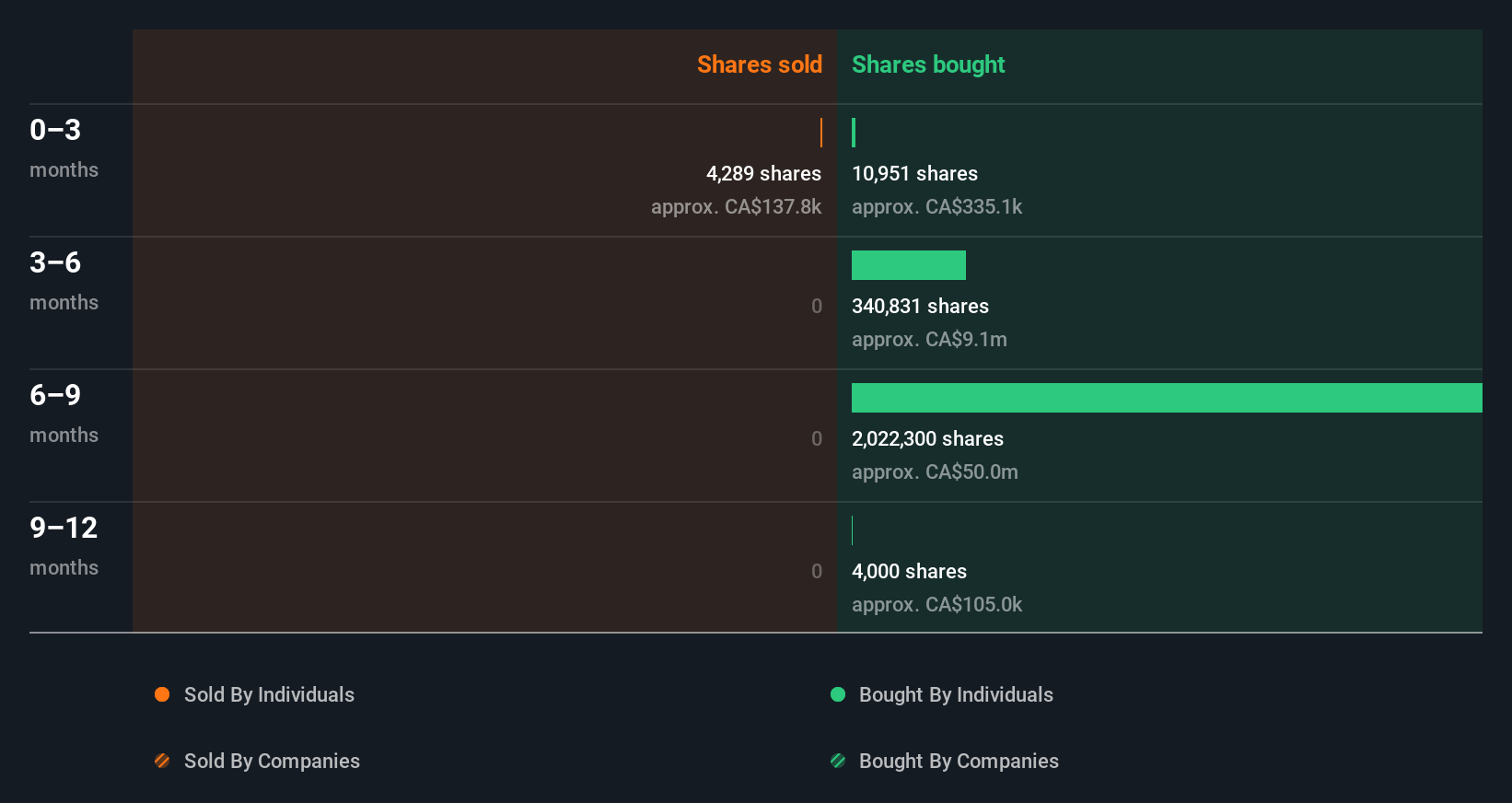Quite a few insiders have dramatically grown their holdings in Saputo Inc. (TSE:SAP) over the past 12 months. An insider's optimism about the company's prospects is a positive sign.
Although we don't think shareholders should simply follow insider transactions, logic dictates you should pay some attention to whether insiders are buying or selling shares.
Saputo Insider Transactions Over The Last Year
In the last twelve months, the biggest single purchase by an insider was when insider Joey Saputo bought CA$34m worth of shares at a price of CA$24.69 per share. Even though the purchase was made at a significantly lower price than the recent price (CA$34.52), we still think insider buying is a positive. Because the shares were purchased at a lower price, this particular buy doesn't tell us much about how insiders feel about the current share price.
Over the last year, we can see that insiders have bought 2.38m shares worth CA$59m. But insiders sold 4.29k shares worth CA$138k. In total, Saputo insiders bought more than they sold over the last year. You can see the insider transactions (by companies and individuals) over the last year depicted in the chart below. By clicking on the graph below, you can see the precise details of each insider transaction!
Check out our latest analysis for Saputo

There are plenty of other companies that have insiders buying up shares. You probably do not want to miss this free list of undervalued small cap companies that insiders are buying.
Insiders At Saputo Have Bought Stock Recently
At Saputo,over the last quarter, we have observed quite a lot more insider buying than insider selling. Insiders spent CA$353k on shares. But insider Robert Edwards sold shares worth CA$138k. We think insiders may be optimistic about the future, since insiders have been net buyers of shares.
Does Saputo Boast High Insider Ownership?
Another way to test the alignment between the leaders of a company and other shareholders is to look at how many shares they own. Usually, the higher the insider ownership, the more likely it is that insiders will be incentivised to build the company for the long term. It's great to see that Saputo insiders own 40% of the company, worth about CA$5.8b. Most shareholders would be happy to see this sort of insider ownership, since it suggests that management incentives are well aligned with other shareholders.
What Might The Insider Transactions At Saputo Tell Us?
It is good to see recent purchasing. And an analysis of the transactions over the last year also gives us confidence. However, we note that the company didn't make a profit over the last twelve months, which makes us cautious. Once you factor in the high insider ownership, it certainly seems like insiders are positive about Saputo. Nice! So these insider transactions can help us build a thesis about the stock, but it's also worthwhile knowing the risks facing this company. For example - Saputo has 2 warning signs we think you should be aware of.
Of course Saputo may not be the best stock to buy. So you may wish to see this free collection of high quality companies.
For the purposes of this article, insiders are those individuals who report their transactions to the relevant regulatory body. We currently account for open market transactions and private dispositions of direct interests only, but not derivative transactions or indirect interests.
Mobile Infrastructure for Defense and Disaster
The next wave in robotics isn't humanoid. Its fully autonomous towers delivering 5G, ISR, and radar in under 30 minutes, anywhere.
Get the investor briefing before the next round of contracts
Sponsored On Behalf of CiTechNew: Manage All Your Stock Portfolios in One Place
We've created the ultimate portfolio companion for stock investors, and it's free.
• Connect an unlimited number of Portfolios and see your total in one currency
• Be alerted to new Warning Signs or Risks via email or mobile
• Track the Fair Value of your stocks
Have feedback on this article? Concerned about the content? Get in touch with us directly. Alternatively, email editorial-team (at) simplywallst.com.
This article by Simply Wall St is general in nature. We provide commentary based on historical data and analyst forecasts only using an unbiased methodology and our articles are not intended to be financial advice. It does not constitute a recommendation to buy or sell any stock, and does not take account of your objectives, or your financial situation. We aim to bring you long-term focused analysis driven by fundamental data. Note that our analysis may not factor in the latest price-sensitive company announcements or qualitative material. Simply Wall St has no position in any stocks mentioned.
About TSX:SAP
Saputo
Produces, markets, and distributes dairy products in Canada, the United States, Australia, Argentina, and the United Kingdom.
Flawless balance sheet average dividend payer.
Similar Companies
Market Insights
Weekly Picks

THE KINGDOM OF BROWN GOODS: WHY MGPI IS BEING CRUSHED BY INVENTORY & PRIMED FOR RESURRECTION


Why Vertical Aerospace (NYSE: EVTL) is Worth Possibly Over 13x its Current Price


The Quiet Giant That Became AI’s Power Grid
Recently Updated Narratives


Fiverr International will transform the freelance industry with AI-powered growth

Jackson Financial Stock: When Insurance Math Meets a Shifting Claims Landscape

Stride Stock: Online Education Finds Its Second Act
Popular Narratives


MicroVision will explode future revenue by 380.37% with a vision towards success


Crazy Undervalued 42 Baggers Silver Play (Active & Running Mine)





